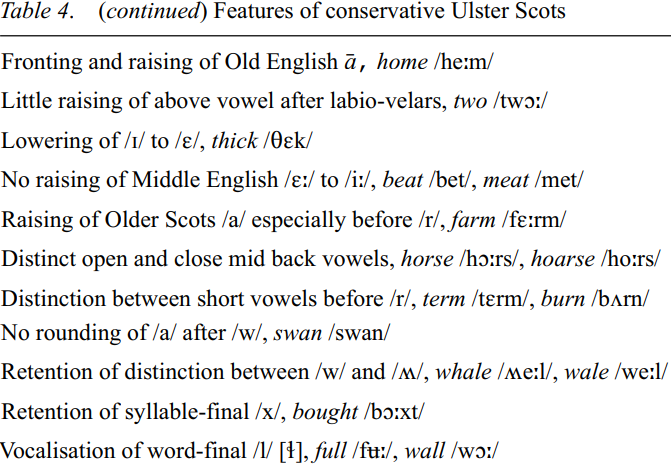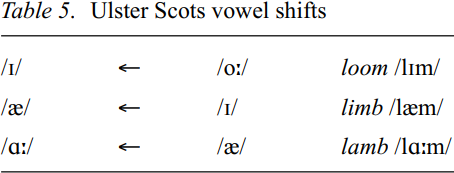


 Grammar
Grammar
 Tenses
Tenses
 Present
Present
 Past
Past
 Future
Future
 Parts Of Speech
Parts Of Speech
 Nouns
Nouns
 Verbs
Verbs
 Adverbs
Adverbs
 Adjectives
Adjectives
 Pronouns
Pronouns
 Pre Position
Pre Position
 Preposition by function
Preposition by function 
 Preposition by construction
Preposition by construction
 Conjunctions
Conjunctions
 Interjections
Interjections
 Grammar Rules
Grammar Rules
 Linguistics
Linguistics
 Semantics
Semantics
 Pragmatics
Pragmatics
 Reading Comprehension
Reading Comprehension|
Read More
Date: 2024-05-17
Date: 29-3-2022
Date: 2024-04-06
|
A treatment of Ulster Scots must start with differentiating between conservative Ulster Scots (braid, i.e. broad, Ulster Scots, which has its base in rural areas of Ulster) and more standard forms which are spoken chiefly in urban centres, parallel to the established distinction in Scotland between Lowland Scots and Scottish Standard English (Harris 1984: 119). An essential feature of standard Ulster Scots is that most words with non-standard Scots vowel values have re-allocated values which are nearer to those in general Ulster English. The following list illustrates vowel values and some consonantal features which are indicative of conservative Ulster Scots; the yardstick of reference is Older Scots (Older Scots), up to 1700, i.e. before the emigration to Ulster began.


The shifts of vowel values in Ulster Scots when compared to southern British English have led to a re-alignment of vowel space. This can best be indicated diagrammatically as follows. The first shift one should note is that of Middle English /o:/ to a front vowel, with or without rounding, i.e. Older Scots  . In Ulster Scots this vowel appears as /I/.
. In Ulster Scots this vowel appears as /I/.

|
|
|
|
علامات بسيطة في جسدك قد تنذر بمرض "قاتل"
|
|
|
|
|
|
|
أول صور ثلاثية الأبعاد للغدة الزعترية البشرية
|
|
|
|
|
|
|
مدرسة دار العلم.. صرح علميّ متميز في كربلاء لنشر علوم أهل البيت (عليهم السلام)
|
|
|